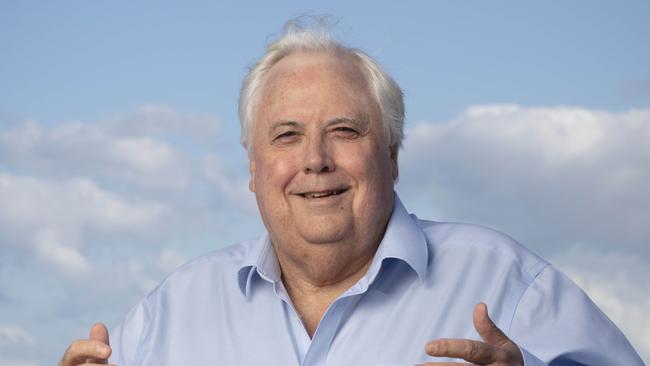State push to quell Clive Palmer’s legal actions
WA has applied to have crucial orders obtained by Clive Palmer set aside on the basis they were obtained without any notice to the state.

Lawyers for the West Australian government will push to have orders obtained by Clive Palmer in his multi-billion-dollar legal claims against the state revoked at an urgent hearing in Brisbane’s Supreme Court on Wednesday.
WA has applied to have the orders set aside on the basis that they were obtained last week without any notice to the state.
The validity of the orders is critical to the future of what is likely to be costly and long-running legal actions between WA and the Queensland billionaire over his plans for his Balmoral South iron ore deposit in the Pilbara.
The WA government last week passed emergency legislation aimed at cutting down the two claims, with state Attorney-General John Quigley warning that the two actions if left unchecked could leave the state viable for more than $30bn in damages.
Mr Palmer denies seeking damages of that magnitude.
Two arbitration orders secured by Mr Palmer years earlier had never been registered in the courts, which the WA government believes left the door open for it to pass legislation killing off the prospect of any payout to or appeal by him.
Mr Palmer has argued that the successful registration of the two actions last Thursday, several hours before the WA legislation passed parliament’s upper house and was signed into law by WA Governor-General Kim Beazley, means the two matters were protected by the Constitution from legislative interference.
WA has argued that the signed legislation came into effect from the start of the day on which it was signed into law, effectively predating Queensland court orders secured by Mr Palmer.
The scale of the potential damages, the deep animosity between the two parties, Mr Palmer’s appetite for legal battles and both sides’ significant financial resources means a protracted legal fight is all but certain.
Mr Palmer is expected to launch a High Court challenge to WA’s legislation this week.
“I don’t know what Mr Palmer will do, but I do know whatever it is will be very self-interested,” WA Premier Mark McGowan said when asked about the prospects of a fresh legal challenge from Mr Palmer.
The first arbitration claim, which Mr Quigley has said could cost the state almost $30bn, stems from a decision by then-premier Colin Barnett to reject a proposal from Mr Palmer’s private companies for development of Balmoral South. An arbitration process ruled the government was required to assess projects before they could be rejected.
The second claim relates to Mr Barnett’s decision to attach 46 conditions to the conditional approval given to Mr Palmer’s Balmoral South plans in 2014.
The condition have not been made public but the former premier has said asbestos in the deposit was a significant issue identified during the process.
Mr Barnett said attaching conditions to a project approval was nothing unusual for major projects. “Palmer could have progressed the project but didn’t,” he said. “This damaging squabble could have been avoided by dealing with the conditions and negotiating a solution.”
Managing asbestos has been an issue for many projects across the Pilbara, home to the infamous Wittenoom asbestos mine.
A report into the Balmoral South project, prepared for Mr Palmer’s International Minerals in February 2009 as part of the development’s environmental approvals process, noted analysis of core samples from the deposit did not detect any asbestos fibres.
“[International Minerals] has recognised it is possible some minerals may give rise to fibrous minerals, and management strategies have been developed to cater for this possibility,” it said.



